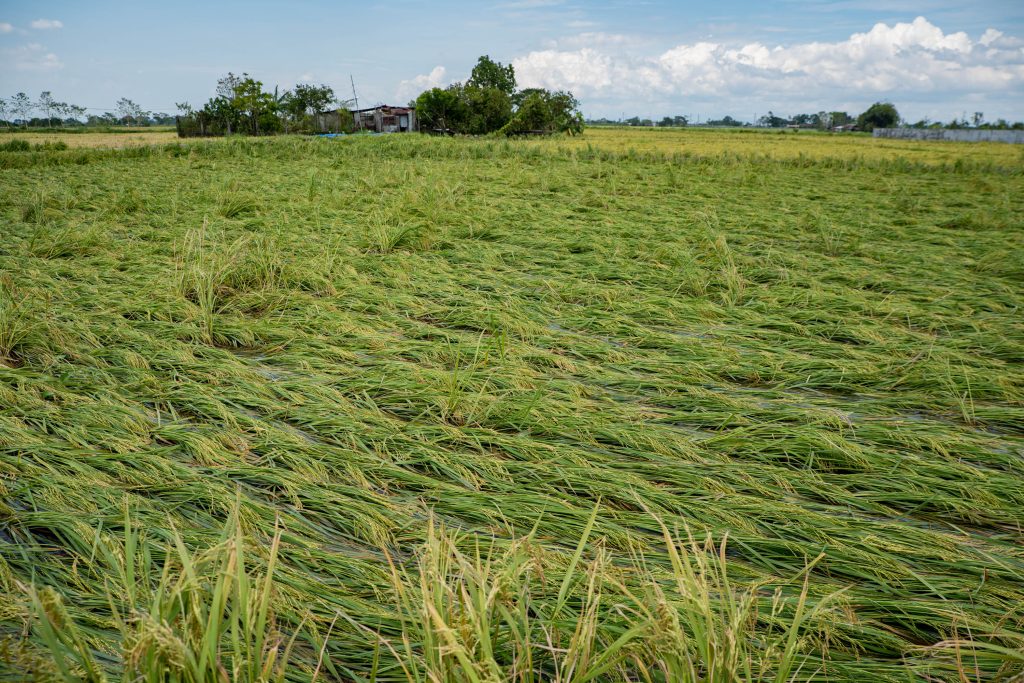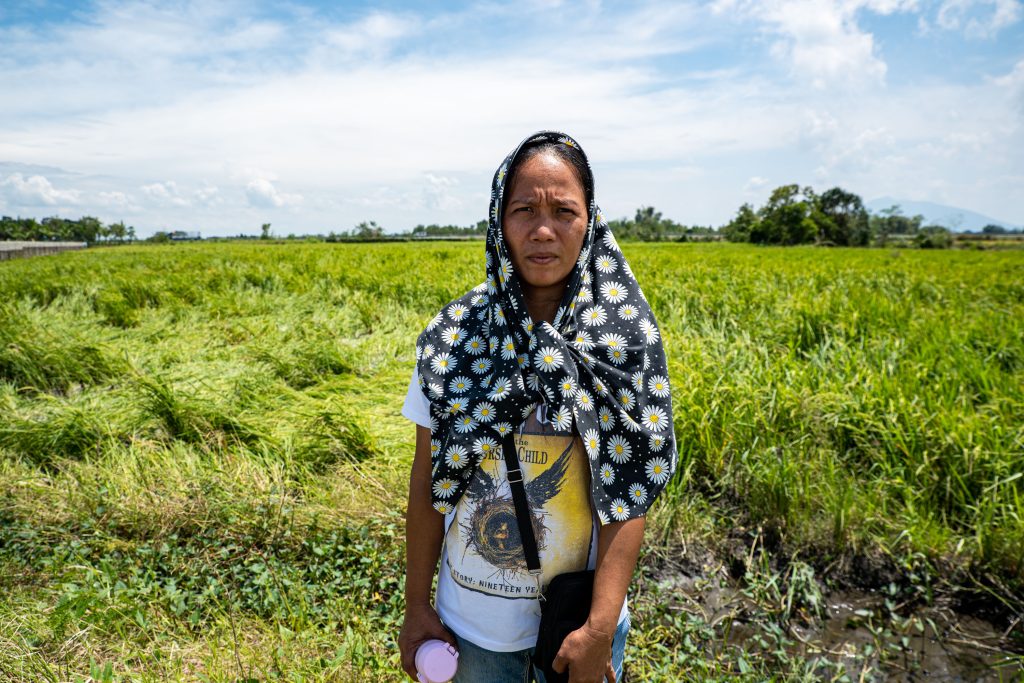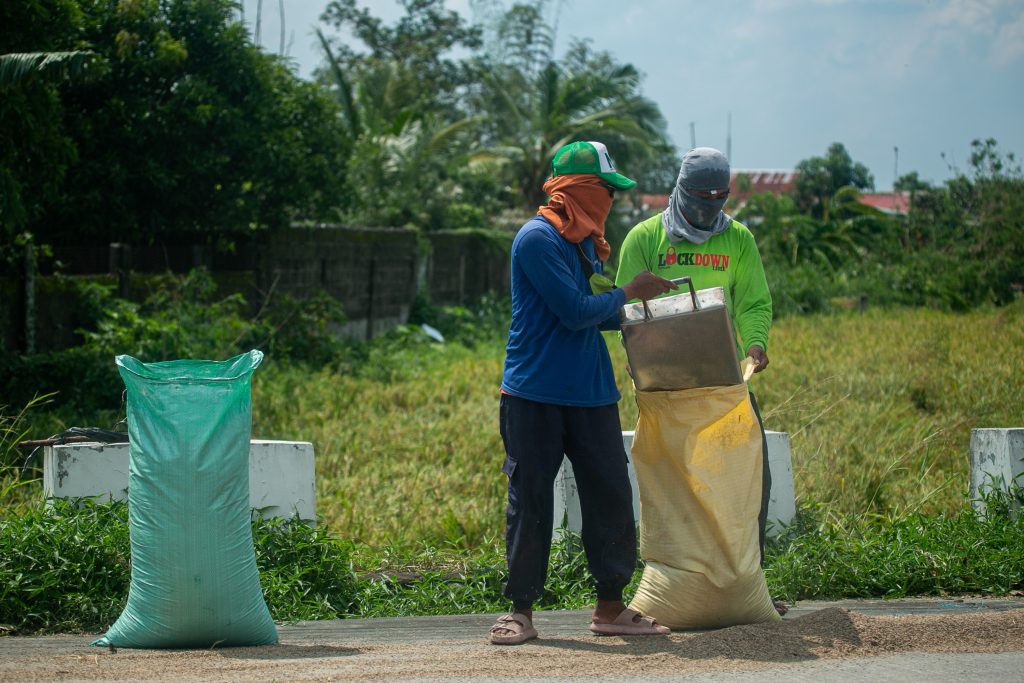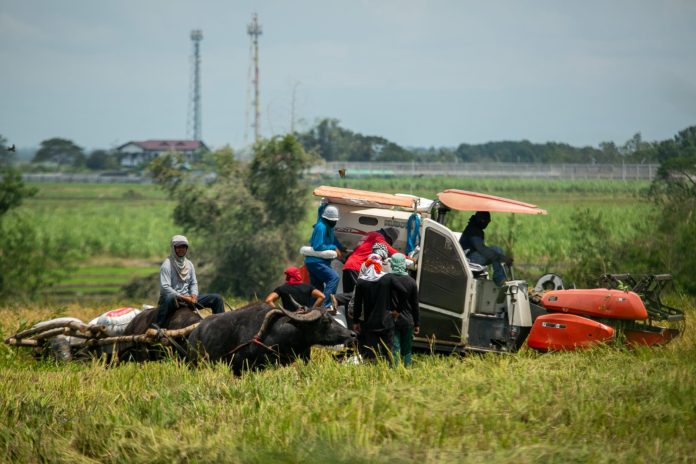The sky fell on Rosario Barrera when she saw her rice field under water because of the rain brought by a super typhoon that hit on the day she was supposed to harvest her crops.
Hopes for a good and bountiful harvest faded as Rosario looked at the golden grains of rice floating on floodwater.
“It was too painful,” she said. “The storm robbed us of everything. Now we have nothing but debts,” said the quadragenarian farmer in the village of Tinang, Concepcion town, in Tarlac province.
Rosario and her siblings lost at least US$3,500 in investments. She said some of the money they spent on the farm came from lenders who expect payment in the coming days.
“The land where we planted is only rented,” said Rosario. “To survive, we rent farmlands to plant our crops,” she said.
She admitted that she has “no idea” where to get money to repay her debts. “That’s all that we’ve got,” she said referring to the money she spent on the farm.
On September 25, super typhoon Karding (international name: Noru) destroyed 148,091 hectares of farmlands in the northern Philippines, affecting about 89,000 farmers and fisherfolk.
The Department of Agriculture reported that PhP1.97 billion (US$33.4 million) worth of damage in the agriculture sector, which translates to a production loss of 114,446 metric tons of produce.
The rice industry accounted for the bulk of damage at 81.57 percent or 145,229 hectares of croplands and a production loss of 105,154 metric tons, which has a value of at least PhP1.61 billion (US$27.3 million).

The Agriculture department announced that various forms of assistance were made available for the typhoon-stricken farmers, including the distribution of:
- PhP170.34 million (US$2.9 million) worth of rice seeds
- PhP23.16 million (US$393,105) worth of corn seeds
- PhP13.55 million (US$230,000) worth of assorted vegetable seeds
The department also said affected farmers may avail financial assistance through the Survival and Recovery Loan Program from the Agricultural Credit Policy Council with loanable amount of up to PhP25,000 (US$500) payable in three years at zero interest.
Several peasant organizations, however, called on the government to distribute a PhP15,000 (US$300) production subsidy instead of offering loans to farmers.
“The distribution production subsidy for farmers and fisherfolk affected by the typhoon is legitimate and urgent,” said Zenaida Soriano, chairperson of the group Amihan National Federation of Peasant Women.
She said Filipino farmers spend so much each cropping season, adding that if they can harvest anything after the devastation of the typhoon, “the price is very cheap.”
“If our government does not act immediately, the farmers will [fall] further in debt,” she said.
Soriano said the excess tariffs collected for the Rice Competitiveness Enhancement Fund (RCEF) in 2021 amounting to PhP8.9 billion (US$151 million) “could be used as an emergency financial assistance for rice farmers.”
“It could benefit 593,000 farmers,” said Soriano, urging President Ferdinand Marcos Jr., who is also the Agriculture secretary, to “make concrete and significant actions to mitigate the impact of climate change.”

‘All is getting worse’
The Philippines is one of the highly vulnerable countries to the effects of climate change and is at the frontline of every other disaster.
Strong typhoons and other impacts of the climate crisis that the country experiences arise through a combination of both anthropogenic and natural calamities.
Experts say that human-induced climate change increases the frequency and severity of overall climate-related events and also intensifies the effects of natural disasters, which lead to more destructive impacts and greater losses and damages.
Rodne Galicha of Living Laudato Si Philippines said the Philippine government must “create a mechanism that would help vulnerable communities mitigate the impacts of the climate crisis.”
“One of the most affected sectors is agriculture every time a disaster hits the country,” he said.
“It is high time for the government to adopt policies for the sector that respond to the needs of the farmers amid the worsening climate crisis,” said Galicha.
He called on the president to consider the declaration of a nationwide climate emergency and “mandate every government agency to plan and implement programs with high considerations on the climate crisis situation.”

‘Empower farmers, not businesses’
The social action arm of the Catholic Church in the Philippines has called on the government to prioritize and strengthen programs “that will empower farmers and not the businesses.”
Father Antonio Labiao Jr., executive secretary of Caritas Philippines, said the government must “review” the country’s crop insurance program and “implement it as a government subsidy so that the money for the insurance premium will not come from the farmers.”
The priest also said that the crop insurance program “must benefit tillers, not the land owners.”
“Regardless of the economic status and land ownership, all tillers or the persons who are doing the actual work should benefit from it,” he said.
Father Labiao urged the Agriculture department “to work overtime in streamlining its database,” which he said is “necessary in identifying who are the real farmers.”
“As of the moment, our database is unreliable. It is very helpful especially in implementing aid and subsidy programs,” said the priest.
He also renewed the call “to support and prioritize local production versus the country’s importation program.”
“Instead of relying on imports, the government must strengthen local production and purchase produce from local farmers,” said Father Labiao.
“We already saw the impact of importation to the rice and vegetable industry. We need to recalibrate and balance these programs,” he said.









